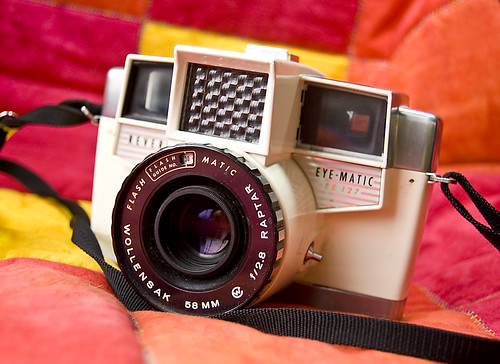Difference between revisions of "Revere Eye-Matic EE 127"
(image added) |
(Fleshed out stub) |
||
| Line 1: | Line 1: | ||
| − | + | The '''Revere Eye-Matic EE 127''' is an auto-exposure 4×4cm [[127 film]] [[rangefinder camera]] made by [[Revere]] around 1958. | |
| − | The '''Revere Eye-Matic EE 127''' is an auto-exposure 4×4cm [[127 film]] [[rangefinder camera]] made by [[Revere]] around 1958. It has a single fixed shutter speed and the aperture is controlled either by the [[selenium]] cell | + | |
| + | The substantial rugged camera body is made of die-cast aluminum with a white or cream baked enamel and brushed aluminum alloy finish. Some versions have the top part of the camera in brushed metal finish (as shown) while others have those same parts painted like the bulk of the body. | ||
| + | |||
| + | It has a single fixed shutter speed and the aperture is controlled either by the [[selenium]] cell, the aperture lever, or the focusing ring (in 'Flash-matic' mode). The 'Flash-matic' guide number automatic flash exposure system is engaged by aligning two red dots on the focusing ring and then setting the flash guide number using the aperture lever beneath the lens. This couples the aperture to the focus position to automatically set flash exposure based on the distance. | ||
| + | |||
| + | It has a [[coupled rangefinder]], bright frame view finder and the selected aperture is displayed in the viewfinder (in all modes). It uses a single-stroke advance lever and frame counter instead of the more traditional knob/red window. Strap lugs are located on the sides of the camera; a tripod socket is located on the bottom of the camera, though no arrangement is made for a cable release. | ||
| + | |||
| + | The lens is a 58mm f/2.8 [[Wollensak]] Raptar (4 element Tessar formula) that stops down to f/22 with flash synchronization. [[ASA]] range is 10 to 100. An unusual low inertia 2 bladed aperture mechanism is used to allow automatic control by the selenium cell. | ||
| + | |||
| + | The camera was touted in ads of the time as producing 'Professional Quality Pictures'. Ruggedly constructed, these cameras can be found to this day in good operating condition. | ||
| + | It listed for an astonishing $139.50 in 1959.<REF> [http://www.flickr.com/photos/10187806@N00/2316918182/ 1959 Revere Ad] on flickr.com</REF> (Over $1000US in 2009!) | ||
{| class="plainlinks" align="center" width=250px style="text-align: center;" | {| class="plainlinks" align="center" width=250px style="text-align: center;" | ||
Revision as of 22:32, 14 December 2010
The Revere Eye-Matic EE 127 is an auto-exposure 4×4cm 127 film rangefinder camera made by Revere around 1958.
The substantial rugged camera body is made of die-cast aluminum with a white or cream baked enamel and brushed aluminum alloy finish. Some versions have the top part of the camera in brushed metal finish (as shown) while others have those same parts painted like the bulk of the body.
It has a single fixed shutter speed and the aperture is controlled either by the selenium cell, the aperture lever, or the focusing ring (in 'Flash-matic' mode). The 'Flash-matic' guide number automatic flash exposure system is engaged by aligning two red dots on the focusing ring and then setting the flash guide number using the aperture lever beneath the lens. This couples the aperture to the focus position to automatically set flash exposure based on the distance.
It has a coupled rangefinder, bright frame view finder and the selected aperture is displayed in the viewfinder (in all modes). It uses a single-stroke advance lever and frame counter instead of the more traditional knob/red window. Strap lugs are located on the sides of the camera; a tripod socket is located on the bottom of the camera, though no arrangement is made for a cable release.
The lens is a 58mm f/2.8 Wollensak Raptar (4 element Tessar formula) that stops down to f/22 with flash synchronization. ASA range is 10 to 100. An unusual low inertia 2 bladed aperture mechanism is used to allow automatic control by the selenium cell.
The camera was touted in ads of the time as producing 'Professional Quality Pictures'. Ruggedly constructed, these cameras can be found to this day in good operating condition. It listed for an astonishing $139.50 in 1959.[1] (Over $1000US in 2009!)

|

|
Picture by Yarnzombie. (Image rights) |
with box; picture by InspiredPhotos |
Links
In French:
- Revere Eye-Matic EE127 on Sylvain Halgand's www.collection-appareils.fr
Notes
- ↑ 1959 Revere Ad on flickr.com